
10th grade biology aligned to the standards that is free.
- Subject:
- Life Science
- Material Type:
- Full Course
- Author:
- John Kinney
- Date Added:
- 05/13/2015


10th grade biology aligned to the standards that is free.
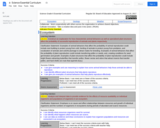
6th Grade Regular Science Scope & Sequence

In this course, you will learn the principles of genetics with application to the study of biological function at the level of molecules, cells, and multicellular organisms, including humans. We will cover structure and function of genes, chromosomes, and genomes; biological variation resulting from recombination, mutation, and selection; population genetics; and the use of genetic methods to modify genes and genomes and analyze protein function, gene regulation, and inherited disease.
This course, based on the MIT course 7.03 Genetics taken by enrolled MIT students, was organized as a three-part series on edX by MIT’s Department of Biology (Note: The third part of the course is not available yet). It is self-paced and free as long as you enroll in the Audit Track option, which you can select after creating a free account on edX.

In this course, you will engage in the biology of cells of higher organisms. You will study the structure, function, and biosynthesis of cellular membranes and organelles; cell growth and oncogenic transformation; transport, receptors, and cell signaling; the cytoskeleton, the extracellular matrix, and cell movements; cell division and cell cycle; functions of specialized cell types. This course emphasizes the current molecular knowledge of cell biological processes as well as the genetic, biochemical, and other experimental approaches that resulted in these discoveries.
This course, based on the MIT course 7.06 Cell Biology taken by enrolled MIT students, was organized as a three-part series on edX by MIT’s Department of Biology. It is self-paced and free as long as you enroll in the Audit Track option, which you can select after creating a free account on edX.

This course is an in-depth adventure through the molecular mechanisms that control the maintenance, expression, and evolution of prokaryotic and eukaryotic genomes. Through lectures and readings of relevant literature, students will explore gene regulation, DNA replication, genetic recombination, transcription, and mRNA translation. The quizzes are designed to build students' experimental design and data analysis skills.
This course, based on the MIT course 7.28/7.58 Molecular Biology taken by enrolled MIT students, was organized as a three-part series on edX by MIT’s Department of Biology. It is self-paced and free as long as you enroll in the Audit Track option, which you can select after creating a free account on edX.
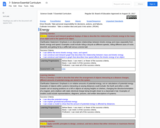
7th Grade Regular Science Scope & Sequence
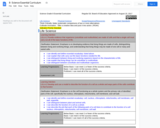
8th Grade Regular Science Scope & Sequence

8th Standard
Science Textbook Lesson
Chapter 11
Force & Pressure
NCERT Syllabus

This training course is an introduction to the use of the AFNI software suites for the analysis of functional MRI (fMRI) data. It is not intended as an introduction to how fMRI works but is aimed at people who are already doing fMRI data analysis, or those who will be in the near future.
AFNI (Analysis of Functional NeuroImages) is a leading software suite of C, Python, and R programs and shell scripts, primarily developed for the analysis and display of anatomical and fMRI data. It is freely available for research purposes.
This event was organized by the Center for Brains, Minds, and Machines (CBMM) Trainee Leadership Council.
CBMM is a multi-institutional NSF Science and Technology Center headquartered at MIT that is dedicated to developing a computationally based understanding of human intelligence and establishing an engineering practice based on that understanding. CBMM brings together computer scientists, cognitive scientists, and neuroscientists to create a new field—the science and engineering of intelligence.

Introduction to the linguistic study of language pathology, concentrating on experimental approaches and theoretical explanations. Discussion of Specific Language Impairment, autism, Down syndrome, Williams syndrome, normal aging, Parkinson's disease, Alzheimer's disease, hemispherectomy and aphasia. Focuses on the comparison of linguistic abilities among these syndromes, while drawing clear comparisons with first and second language acquisition. Topics include the lexicon, morphology, syntax, semantics and pragmatics. Relates the lost linguistic abilities in these syndromes to properties of the brain.

The Acoustics of Speech and Hearing is an H-Level graduate course that reviews the physical processes involved in the production, propagation and reception of human speech. Particular attention is paid to how the acoustics and mechanics of the speech and auditory system define what sounds we are capable of producing and what sounds we can sense. Areas of discussion include:
the acoustic cues used in determining the direction of a sound source,
the acoustic and mechanical mechanisms involved in speech production and
the acoustic and mechanical mechanism used to transduce and analyze sounds in the ear.
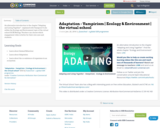
An alternative introduction to the chapter "Adapting and Living Together" - explained with Vamipres! It sits within the Ecology and Environment topic of the virtual school GCSE Biology. Teachers can choose which engagement video is better for their own uses and students.
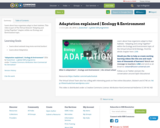
Learn about how organisms adapt to their habitats. This video is part of The Virtual School's "Adapting and Living Together" chapter within our Ecology and Environment topic.
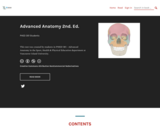
Short Description:
This text was created by students in PHED 301 - Advanced Anatomy in the Sport, Health & Physical Education department at Vancouver Island University.
Word Count: 115766
(Note: This resource's metadata has been created automatically by reformatting and/or combining the information that the author initially provided as part of a bulk import process.)

The course includes survey and special topics designed for graduate students in the brain and cognitive sciences. It emphasizes ethological studies of natural behavior patterns and their analysis in laboratory work, with contributions from field biology (mammology, primatology), sociobiology, and comparative psychology. It stresses mammalian behavior but also includes major contributions from studies of other vertebrates and of invertebrates. It covers some applications of animal-behavior knowledge to neuropsychology and behavioral pharmacology.

This course is a graduate introduction to natural language processing - the study of human language from a computational perspective. It covers syntactic, semantic and discourse processing models, emphasizing machine learning or corpus-based methods and algorithms. It also covers applications of these methods and models in syntactic parsing, information extraction, statistical machine translation, dialogue systems, and summarization. The subject qualifies as an Artificial Intelligence and Applications concentration subject.
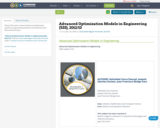
Study of the most common advanced optimisation models in engineering problems, both Industrial and Telecommunication.

12.491 is a seminar focusing on problems of current interest in geology and geochemistry. For Fall 2005, the topic is organic geochemistry. Lectures and readings cover recent research in the development and properties of organic matter.

This course introduces students to a quantitative approach to studying the problems of physiological adaptation in altered environments, especially microgravity and partial gravity environments. The course curriculum starts with an Introduction and Selected Topics, which provides background information on the physiological problems associated with human space flight, as well as reviewing terminology and key engineering concepts. Then curriculum modules on Bone Mechanics, Muscle Mechanics, Musculoskeletal Dynamics and Control, and the Cardiovascular System are presented. These modules start out with qualitative and biological information regarding the system and its adaptation, and progresses to a quantitative endpoint in which engineering methods are used to analyze specific problems and countermeasures. Additional course curriculum focuses on interdisciplinary topics, suggestions include extravehicular activity and life support. The final module consists of student term project work.

This course studies the relations of affect to cognition and behavior, feeling to thinking and acting, and values to beliefs and practices. These connections will be considered at the psychological level of organization and in terms of their neurobiological and sociocultural counterparts.